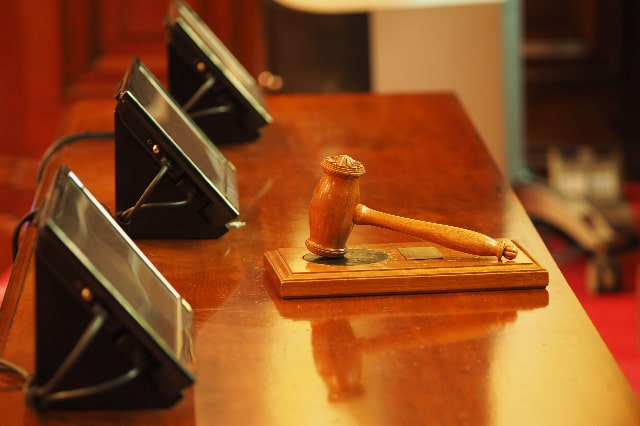Trusted domestic violence attorney
When you are charged for false imprisonment in Georgia, you may be unaware of your options. Lawyers from Conoscienti and Ledbetter can help in your case. Contact us now for legal representation!
 Author: J. Blake Ledbetter, Partner, Conoscienti & Ledbetter
Author: J. Blake Ledbetter, Partner, Conoscienti & Ledbetter
Mr. Ledbetter specializes in civil litigation in metropolitan Atlanta, Georgia, and possesses vast experience in wrongful death lawsuits. Mr. Ledbetter was recognized as a SuperLawyers Rising Star in 2018 and 2019 in the area of Civil Litigation. Published on September 09, 2023.

Speak with experienced domestic violence attorney today, for free.
False Imprisonment Laws in Georgia (GA Code 16-5-41)
In Georgia, a person commits the offense of false imprisonment when they unlawfully detain someone against their will. You may face false imprisonment charges anytime you hold a person without legal authority. False imprisonment violates someone’s personal liberty and fundamental civil rights. It is an intentional civil wrong that gives rise to claims for damages under Georgia law.
Although some similarities exist, false imprisonment differs from kidnapping and false arrests. Kidnapping involves the movement of a person without legal authority. In contrast, a false arrest is unlawfully detaining someone concerning the commission of an alleged crime. False imprisonment involves confining a person in a certain area and preventing them from leaving. But preventing someone from entering a specific place is not false imprisonment.
False imprisonment may arise from using words or actions that do not involve physical violence. It is enough that your victim believed they would suffer harm if they left the area. Some common examples of false imprisonment in Georgia include:
-
Using verbal threats to confine a person
-
Using physical force to restrain someone without probable cause
-
Preventing someone from leaving their home
-
Locking someone up in their room
-
A store owner detaining a theft suspect for an unreasonable amount of time
You may have an actionable false imprisonment claim brought against you for any of the above acts. Sometimes, false imprisonment cases arise from issues of domestic violence. Discussing with a domestic violence attorney who can help your case is important.
What Is the Punishment for False Imprisonment in Georgia?
False imprisonment is a felony in Georgia which may result in severe consequences for the offender. A person convicted of false imprisonment will face imprisonment for at least one year but not more than ten years. You may also be subject to the payment of massive fines.
Confining a victim under fourteen years who is not your child may lead to more severe penalties. You may be subject to the sentencing and punishment provisions under Georgia’s sex offender laws. Your punishment may also increase if you held the victim for over twelve hours.
In addition to imprisonment and fines, the victim may bring a civil claim for damages against you. They may sue for monetary damages, including:
- Compensatory damages: Lost wages, medical or rehabilitation expenses, pain, and suffering.
- Punitive damages: Awarded to punish the offender and deter others from engaging in similar conduct.
- Nominal damages: Awarded where the offender is guilty but caused little or no harm.
The judge, by discretion, may impose probation instead of imprisonment in some instances. You must report to your probation officer if you are placed on probation. You may also have to submit drug tests, attend counseling, or participate in community service.
A felony conviction means that you will have a criminal record in Georgia. A criminal record can have detrimental consequences for your life and future. You may lose your ability to buy a house, own a firearm, or obtain credit. You may also lose your current job and ability to secure future employment.

Speak with trusted domestic violence attorney today, for free.
Are There Defenses for False Imprisonment in Georgia?
Getting charged with false imprisonment in Georgia may be devastating. However, there are certain defenses available to fight your criminal charges, including:
-
Lack of Intent: Before a conviction for false imprisonment, you must have an intent to detain the victim. If imprisonment took place without your knowledge, you may have a good defense. For example, locking someone in a building without knowing they were still on the premises.
-
Consent: If the victim was aware of the confinement, they cannot argue for false imprisonment. For instance, a victim agrees to be confined due to mental illness.
-
Acting in good faith: If you only act in good faith, it may serve as a good defense. For instance, confining a person because they wanted to harm themselves.
-
Imprisonment was lawful: The defendant confined the victim after they committed an offense while alerting the police. For example, detaining someone who stole something from a shop may not qualify as false imprisonment. But, you must prove to the court that the confinement was reasonable.
-
There was a reasonable way out: There may be no confinement without a reasonable means to escape. For example, being locked up in a house with open windows.
-
The victim was unaware of the confinement: A victim without any idea of their detainment cannot argue false imprisonment.
-
The victim was not confined: Not letting someone go where they want to is not enough proof of confinement. For example, sending a person another way is not false imprisonment if the road is closed due to a parade.
Can False Imprisonment Cases Be Expunged From Criminal Records?
In Georgia, not all records can be expunged. Expunging your false imprisonment charges from your record depends on several factors. If the charges against you were dropped or dismissed, you may qualify for expungement.
You may also qualify if you complete the terms of your probation without committing another offense. It is unlikely that false imprisonment involving serious violence can be expunged.
How Can an Attorney Help with False Imprisonment Charges?
If you face false imprisonment charges, an attorney can play a crucial role in your defense. They will thoroughly examine the details of your case, assess the evidence against you, and work to build a strong defense strategy. An experienced attorney can challenge the prosecution’s evidence, question witnesses, and seek to uncover any inconsistencies or discrepancies in the allegations made against you.
Additionally, they may explore potential defenses such as proving a lack of intent, establishing mistaken identity, or demonstrating that you were acting in self-defense or under duress. With their knowledge of the law and courtroom experience, an attorney can navigate the complexities of the legal system to pursue the best possible outcome for your false imprisonment case, whether it be getting the charges dismissed, negotiating a plea deal, or obtaining an acquittal at trial.

Don’t delay. Schedule a risk-free consultation today.
Get In Touch With a Criminal Defense Lawyer
False imprisonment charges can affect your job, reputation and separate you from your family. Hiring a competent criminal attorney is essential to increase your chances of acquittal. The right attorney can make or break your case. At Conoscienti and Ledbetter, we are aware of the consequences of a false imprisonment charge. We will fight to protect your rights and help you avoid a conviction.
Our civil lawyer in Atlanta can investigate your case and evaluate the options available. We can interview witnesses who were present and legally represent you in court. We can fight to dismiss your charges by arguing that the prosecution lacks sufficient evidence. If a guilty verdict is not possible, we can negotiate with the prosecution to reduce your charges.
Contact us today if you suspect you or a loved one has suffered harm from false imprisonment.
Decatur Office
(404) 373-5800
315 W Ponce de Leon Ave. Suite 400 Decatur, GA 30030






